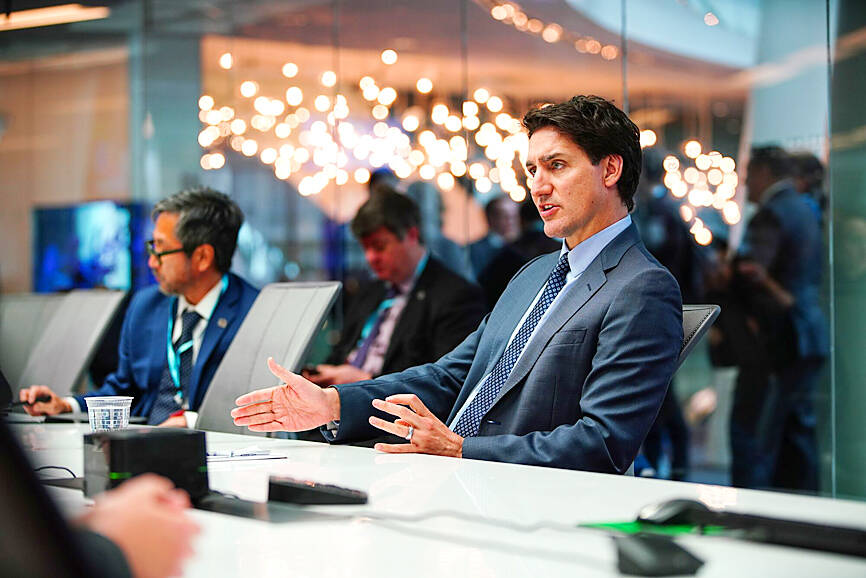Canadian Prime Minister Justin Trudeau on Friday linked the production of lithium in China to “slave labor” as he discussed his own country’s efforts to ramp up production of the metal used in electric vehicle and other batteries.
Canada has significant sources of lithium, but China has made strategic choices over the decades that have made it by far the world’s largest producer, Trudeau said.
“If we’re honest ... the lithium produced in Canada is going to be more expensive, because we don’t use slave labor,” Trudeau said in remarks at the Council on Foreign Relations think tank in New York.

Photo: Bloomberg
“Because we put forward environmental responsibility as something we actually expect to be abided by. Because we count on working with, in partnership, with Indigenous peoples, paying their living wages, expecting security and safety standards,” he said.
A representative for the Chinese embassy in Ottawa did not respond to a request for comment.
Canada last year announced a tougher policy on critical mineral investment — particularly from China — as it worked to shore up its domestic supply after the COVID-19 pandemic exposed supply chain problems.
“If the pandemic taught us anything, if the pandemic taught us anything, it’s resilience, redundancy and reliability in our supply chains,” Trudeau said.
The US has alleged use of forced labor by China in sectors including mining and construction. Last year, a US law took effect banning imports from China’s Xinjiang region over concerns about forced labor.
In December last year, the United Auto Workers union called on automakers to shift their entire supply chain out of Xinjiang after a report by Britain’s Sheffield Hallam University suggested that nearly every major automaker has significant exposure to products made with forced labor.
China denies abuses in Xinjiang, a major cotton producer that also supplies much of the world’s materials for solar panels.
Chinese firms also own, operate or finance most of the Democratic Republic of the Congo’s cobalt mines, the US Department of Labor said in a recent report.
“Our research shows that lithium-ion batteries are produced with an input — cobalt — made by child labor,” it said.
Diplomatic tensions between Canada and China have been running high since the detention of Huawei Technologies Co (華為) executive Meng Wanzhou (孟晚舟) in 2018 and Beijing’s subsequent arrest of two Canadians on spying charges.
In November, Canada ordered three Chinese companies to divest from Canadian critical minerals, citing national security. China in response accused Ottawa of using national security as a pretext and said the divestment order broke international commerce and market rules.
Other commodities:
‧ Gold for June delivery rose US$0.10 to US$1,999.10 per ounce, up 0.43 percent from a week earlier.
‧ Silver for July delivery rose US$0.02 to US$25.23 per ounce, up -0.68 percent weekly.
‧ July copper rose US$0.01 to US$3.89 per pound, down 2.26 percent.
Additional reporting by AP

SELL-OFF: Investors expect tariff-driven volatility as the local boarse reopens today, while analysts say government support and solid fundamentals would steady sentiment Local investors are bracing for a sharp market downturn today as the nation’s financial markets resume trading following a two-day closure for national holidays before the weekend, with sentiment rattled by US President Donald Trump’s sweeping tariff announcement. Trump’s unveiling of new “reciprocal tariffs” on Wednesday triggered a sell-off in global markets, with the FTSE Taiwan Index Futures — a benchmark for Taiwanese equities traded in Singapore — tumbling 9.2 percent over the past two sessions. Meanwhile, the American depositary receipts (ADRs) of Taiwan Semiconductor Manufacturing Co (TSMC, 台積電), the most heavily weighted stock on the TAIEX, plunged 13.8 percent in

A wave of stop-loss selling and panic selling hit Taiwan's stock market at its opening today, with the weighted index plunging 2,086 points — a drop of more than 9.7 percent — marking the largest intraday point and percentage loss on record. The index bottomed out at 19,212.02, while futures were locked limit-down, with more than 1,000 stocks hitting their daily drop limit. Three heavyweight stocks — Taiwan Semiconductor Manufacturing Co (TSMC, 台積電), Hon Hai Precision Industry Co (Foxconn, 鴻海精密) and MediaTek (聯發科) — hit their limit-down prices as soon as the market opened, falling to NT$848 (US$25.54), NT$138.5 and NT$1,295 respectively. TSMC's

TARIFFS: The global ‘panic atmosphere remains strong,’ and foreign investors have continued to sell their holdings since the start of the year, the Ministry of Finance said The government yesterday authorized the activation of its NT$500 billion (US$15.15 billion) National Stabilization Fund (NSF) to prop up the local stock market after two days of sharp falls in reaction to US President Donald Trump’s new import tariffs. The Ministry of Finance said in a statement after the market close that the steering committee of the fund had been given the go-ahead to intervene in the market to bolster Taiwanese shares in a time of crisis. The fund has been authorized to use its assets “to carry out market stabilization tasks as appropriate to maintain the stability of Taiwan’s

In a small town in Paraguay, a showdown is brewing between traditional producers of yerba mate, a bitter herbal tea popular across South America, and miners of a shinier treasure: gold. A rush for the precious metal is pitting mate growers and indigenous groups against the expanding operations of small-scale miners who, until recently, were their neighbors, not nemeses. “They [the miners] have destroyed everything... The canals, springs, swamps,” said Vidal Britez, president of the Yerba Mate Producers’ Association of the town of Paso Yobai, about 210km east of capital Asuncion. “You can see the pollution from the dead fish.